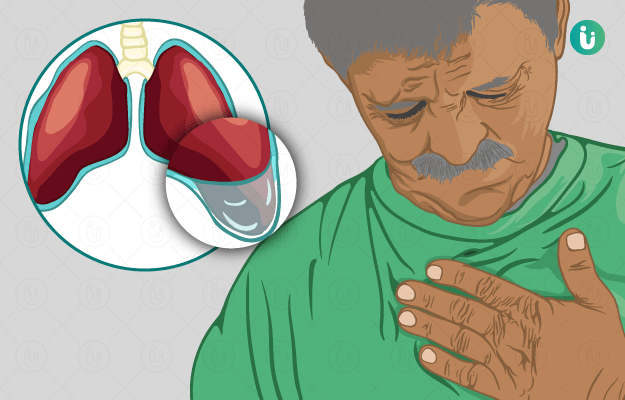What is Pleural Effusion?
Pleural effusion refers to a medical condition in which there is a build-up of fluid in the space between the coverings of the lungs. Normally, this space, also known as the pleural space, already consists of minimal fluid, which helps to prevent friction as the lungs expand and contract during the breathing process. An individual with pleural effusion presents with an accumulation of excessive fluid in this pleural space and severe chest pain.
What are its main signs and symptoms?
The symptoms of pleural effusion begin to show up with increasing accumulation of excessive fluid in the pleural space. These symptoms are:
- A dry and persistent cough.
- Difficulty in breathing.
- Chest pain.
- Fever.
- Hiccups.
- Rapid breathing.
In some individuals, pleural effusion may not produce any symptoms at all till advanced stages.
What are the main causes?
Causes of pleural effusion can be as follows:
- Heart failure.
- Lung infection.
- Lung cancer.
- Liver dysfunction.
- Kidney diseases.
- Injury to the chest and lung.
Excessive smoking and consumption of alcohol increase the risk of pleural effusion. In some cases, injury during surgery may also lead to pleural effusion.
How is it diagnosed and treated?
The diagnosis of pleural effusion usually begins with the examination of the physical symptoms. Other diagnostic tests include:
- Chest CT scan.
- Chest X-ray.
- Blood tests.
- Lung biopsy.
- Lab testing of the pleural fluid.
After diagnosing the condition, the doctor will initiate the treatment in order to remove the excess fluid and then prevent the fluid from building up again. The doctor will also want to determine the exact cause of pleural effusion in order to prevent the condition from recurring.
If the fluid build-up is due to heart failure, diuretics may be prescribed. Antibiotics may be used for treating infectious causes of pleural effusion.
A chest tube may be used for draining the fluid from the pleural space.
Pleural effusion is a serious condition and can lead to severe complications if left untreated.

 Doctors for Pleural Effusion
Doctors for Pleural Effusion 


















